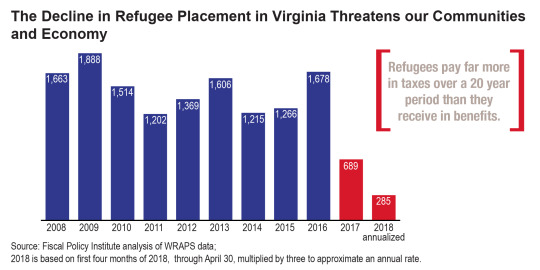May 22, 2018
Refugees are Valuable Contributors to Virginia’s Workplaces
Refugees are major contributors to Virginia’s communities and economy (as we’ve written about before). And a groundbreaking new report by the Fiscal Policy Institute (FPI) and Tent Foundation adds substantial evidence to further demonstrate the valuable role refugees play in the workplace.
The new report finds employers across the country have positive experiences hiring refugees, see new recruitment opportunities and greater retention of these employees, and in turn save money by not having to retrain staff as often. Refugees are also net-positive contributors to state and local tax bases. Despite these benefits, federal policies since 2017 have limited the number of refugees placed in Virginia, harming the future economic prospects of these individuals and the commonwealth.
FPI and the Tent Foundation conducted interviews with employers of refugees across four regions of the country for the report, along with analyzing industry data. The employers they interviewed were generally very happy with refugee employees, who were often more likely to stay with a company over time and maintain a positive disposition towards the work. This is in line with the findings of a recent local report by the Harrisonburg Rockingham Chamber of Commerce (along with the City of Harrisonburg and James Madison University) that detailed how vital migrants have been for the local economy and community, and for keeping the population from shrinking (the Harrisonburg metro area happens to have the 11th highest share of refugees nationally and the highest in Virginia).
Refugees often work in jobs with traditionally high turnover, such as meat-packing and hotel accommodations. Interviews with employers revealed that refugees are more likely to remain in hard-to-staff jobs if employers make simple accommodations, such as providing more bereavement time and being patient when differences in cultural norms arise. For the most part, refugees in Virginia work in similar industries to other Virginians – with the exception of being slightly over-represented in health services, retail, and transportation and warehousing (all critical industries that contribute to thriving local economies).
Beyond receiving high marks from employers, refugees are net-contributors to both our state and federal tax base – meaning on average, they pay far more taxes over a 20 year period than they receive back in benefits. This means that when decreasing the number of refugees that we place in Virginia, we can expect to see an adverse impact on our state revenues over time – affecting our ability to pay for core services like roads, schools, and public safety.

The causes of the drawdown in refugee placements stem from decisions made by the federal administration to put lower caps on refugee placements nationally. Indeed, Virginia communities and employers are not alone in being harmed by the reduction of refugee placements, which is taking place nationwide.
A large body of evidence points towards refugees strengthening our communities. They are on average tax contributors, more entrepreneurial than the general population, receive high praise from employers, stabilize or grow populations in localities that may otherwise be in decline, and enrich communities through their culture (just look at a list of Harrisonburg’s calendar of events or best restaurants for evidence).
Over the past years, world-wide, there were more people displaced from their homes due to disaster, war, conflict or other reasons since the World War II period. With such great need, and such great benefits for our communities and employers, increasing our intake of refugees back to normal levels would be a win-win for everyone.
Category:
Immigration
